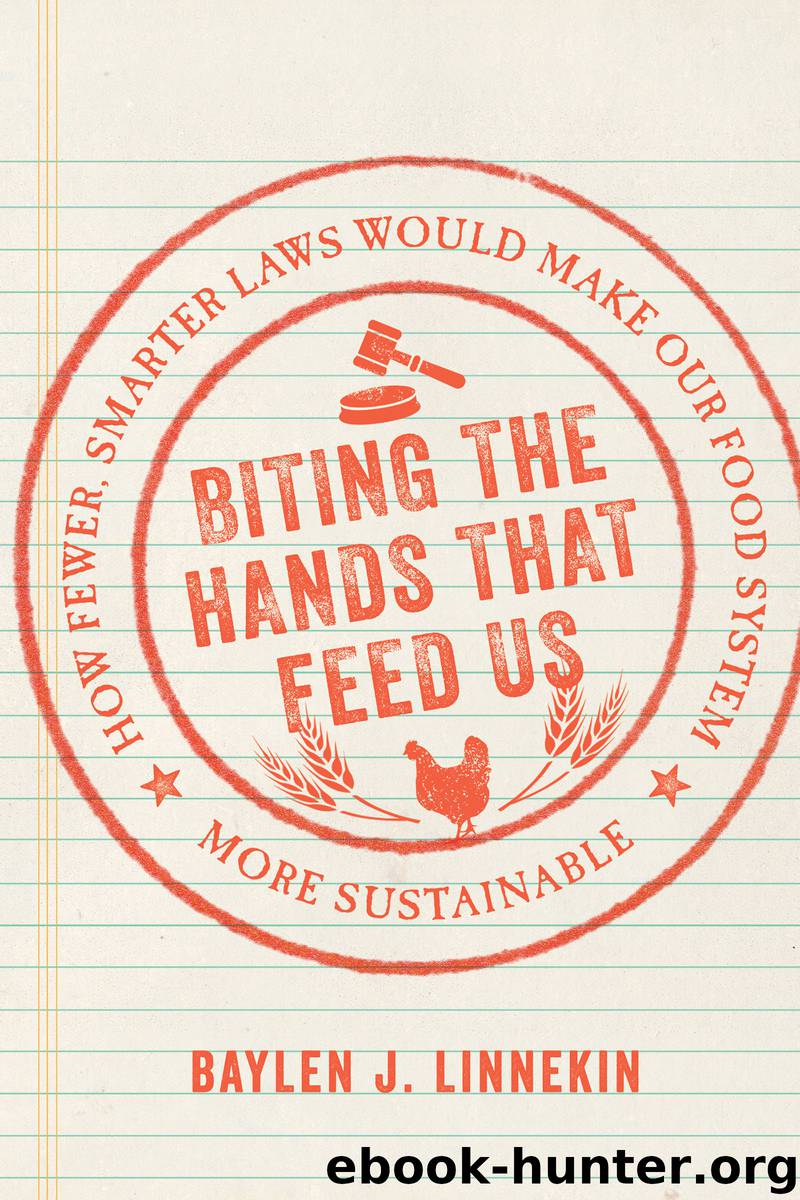Biting the Hands that Feed Us by Baylen J. Linnekin

Author:Baylen J. Linnekin [Linnekin, Baylen J.]
Language: eng
Format: epub, pdf
ISBN: 978-1-61091-676-9
Publisher: Island Press
Published: 2016-08-04T16:00:00+00:00
Throwback Rules
No discussion of rules that promote food waste would be complete without focusing on federal, state, and international rules that, together, promote the wanton devastation of countless fish and other marine life in the world’s oceans and seas. Bycatch, the term used to describe much of this senseless waste, is the harvesting of nontarget fish and other marine animals. Bycatch is often what happens when fishermen literally cast a wide net, trawl the bottom of the ocean indiscriminately, or use other unsustainable fishing practices in the quest to catch a certain species—tuna or shrimp, for example—and end up also catching turtles, sharks, dolphins, salmon, and other species the fishermen did not intend to catch. The Safina Center at New York’s Stony Brook University says most bycatch is “already dead when it hits the” boat. But bycatch also includes fish that are alive but are “the wrong size, poor quality, low market value, or [keeping them is] prohibited for conservation reasons.”94
The data on bycatch are as stunning and depressing as any on food waste caused by school lunches policies, fruit and vegetable grading, or other food-waste sources. The Monterey Bay Aquarium reports that up to six pounds of other species die for every pound of shrimp hauled to shore.95 A 2014 report on bycatch by the group Oceana, a nonprofit dedicated to protecting the world’s oceans, noted that up to 40 percent of fish caught worldwide—or 63 billion pounds of fish, marine mammals, and other ocean dwellers—is bycatch.96 The figures in the United States are slightly better, the group reported, with bycatch representing about one-fifth of the domestic catch.
Efforts to promote sustainable fishing, the Pew Charitable Trusts noted in 2015, focus on the dual goals of “reduc[ing] bycatch while allowing fishing to continue.”97 The leading law regulating U.S. fisheries is the Magnuson-Stevens Fishery Conservation and Management Act (MSA).98 This law, adopted in 1976, established eight regional councils that support and protect fish stocks within their respective regions through various quotas, limits, and other policies. Much of the conversation about limiting waste and bycatch typically revolves around the need to strengthen or expand the MSA. There’s indeed some truth to the need for strong laws. For example, in chapter 5—which focuses on good food laws—you’ll learn about why the federal government’s existing ban on the practice of shark finning is an important law that’s worth supporting. But stronger new rules aren’t always the answer. Stronger rules, as you’ve seen in this book, aren’t even often the answer. Just as you’ve seen with the other examples in this chapter of laws that promote food waste, there are plenty of ways that existing rules for fisheries promote waste.
For example, Gib Brogan, of Oceana, told NPR shortly after the group issued its 2014 report on bycatch that “fishing regulations are partly to blame for wasted seafood . . . because fishermen who have permits to catch certain species must throw back other valuable species they accidentally catch—even if the fish are dead.”99 Brogan went
Download
Biting the Hands that Feed Us by Baylen J. Linnekin.pdf
This site does not store any files on its server. We only index and link to content provided by other sites. Please contact the content providers to delete copyright contents if any and email us, we'll remove relevant links or contents immediately.
| Anthropology | Archaeology |
| Philosophy | Politics & Government |
| Social Sciences | Sociology |
| Women's Studies |
The Secret History by Donna Tartt(19023)
The Social Justice Warrior Handbook by Lisa De Pasquale(12182)
Thirteen Reasons Why by Jay Asher(8882)
This Is How You Lose Her by Junot Diaz(6869)
Weapons of Math Destruction by Cathy O'Neil(6260)
Zero to One by Peter Thiel(5782)
Beartown by Fredrik Backman(5729)
The Myth of the Strong Leader by Archie Brown(5491)
The Fire Next Time by James Baldwin(5421)
How Democracies Die by Steven Levitsky & Daniel Ziblatt(5209)
Promise Me, Dad by Joe Biden(5139)
Stone's Rules by Roger Stone(5078)
A Higher Loyalty: Truth, Lies, and Leadership by James Comey(4945)
100 Deadly Skills by Clint Emerson(4910)
Rise and Kill First by Ronen Bergman(4772)
Secrecy World by Jake Bernstein(4736)
The David Icke Guide to the Global Conspiracy (and how to end it) by David Icke(4696)
The Farm by Tom Rob Smith(4500)
The Doomsday Machine by Daniel Ellsberg(4480)
